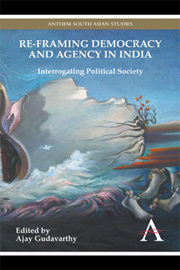Book contents
- Frontmatter
- Contents
- Preface and Acknowledgements
- List of Tables
- Chapter 1 Introduction: Why Interrogate Political Society?
- Part I Political Society and Protest Politics
- Part II Political Society, Middlemen and Mobility
- Chapter 7 The Pyraveekar: The ‘Fixer’ in Rural India
- Chapter 8 Politics of Middlemen and Political Society
- Chapter 9 Widows' Organizations in Kerala State, India: Seeking Citizenship amidst the Decline of Political Society
- Part III Civil Society and/or Political Society
- Part IV Rejoinder
- List of Contributors
Chapter 7 - The Pyraveekar: The ‘Fixer’ in Rural India
from Part II - Political Society, Middlemen and Mobility
Published online by Cambridge University Press: 05 June 2012
- Frontmatter
- Contents
- Preface and Acknowledgements
- List of Tables
- Chapter 1 Introduction: Why Interrogate Political Society?
- Part I Political Society and Protest Politics
- Part II Political Society, Middlemen and Mobility
- Chapter 7 The Pyraveekar: The ‘Fixer’ in Rural India
- Chapter 8 Politics of Middlemen and Political Society
- Chapter 9 Widows' Organizations in Kerala State, India: Seeking Citizenship amidst the Decline of Political Society
- Part III Civil Society and/or Political Society
- Part IV Rejoinder
- List of Contributors
Summary
During the past three decades, the central concern of planners and policymakers in India has been to attack widespread poverty and to bring large numbers of families above the poverty line. Several public policies have been designed to realize this important goal. Popularly known as anti-poverty programmes, these policies are intended to help target groups such as small and marginal farmers, and landless labourers. If implemented with a reasonable degree of efficiency, the programmes would probably have produced better results than they actually have. In fact, according to one observer, ‘none of these have succeeded in achieving these objectives’.
As far as rural development is concerned, the experience with these policies has been that a wide gap still exists between promise and performance. By the late 1960s, it was realized that the benefits of development did not percolate to the poorer sections of society. In order to be effective, these programmes require suitable institutional linkages and the establishment of a number of intermediate institutions through which the new development message can be communicated and the necessary technology transmitted. In a society characterized by rampant illiteracy, poverty, a low level of civic consciousness, and poor communication facilities, the decision-making levels should not only be closer to the people but should also be devoid of formalism and cumbersome procedures. However, the administrative structures responsible for implementing these programmes are modelled on traditional administrative arrangements known for their complexity, cumbersomeness, elitism, centralization, legalism, red tape, and inertia.
- Type
- Chapter
- Information
- Re-framing Democracy and Agency in IndiaInterrogating Political Society, pp. 155 - 170Publisher: Anthem PressPrint publication year: 2012



